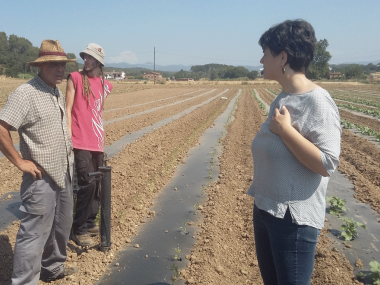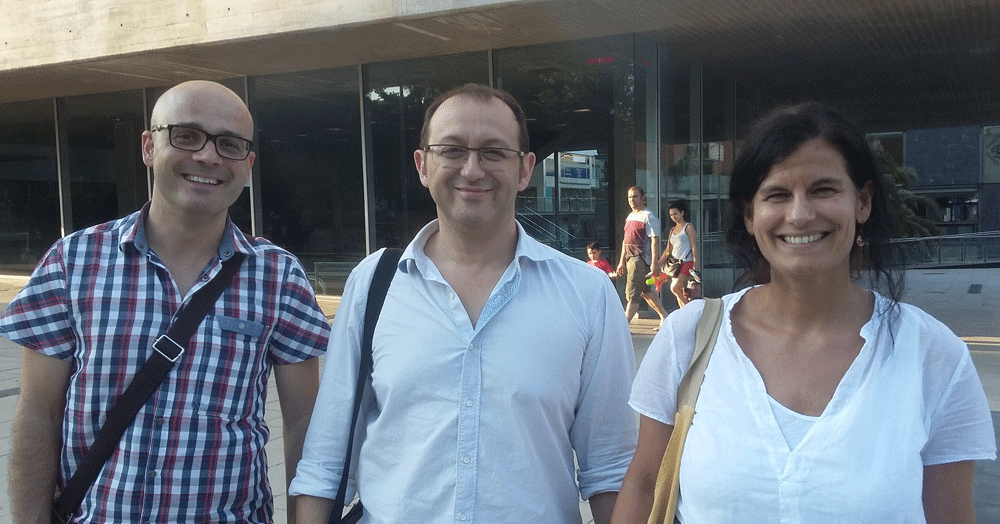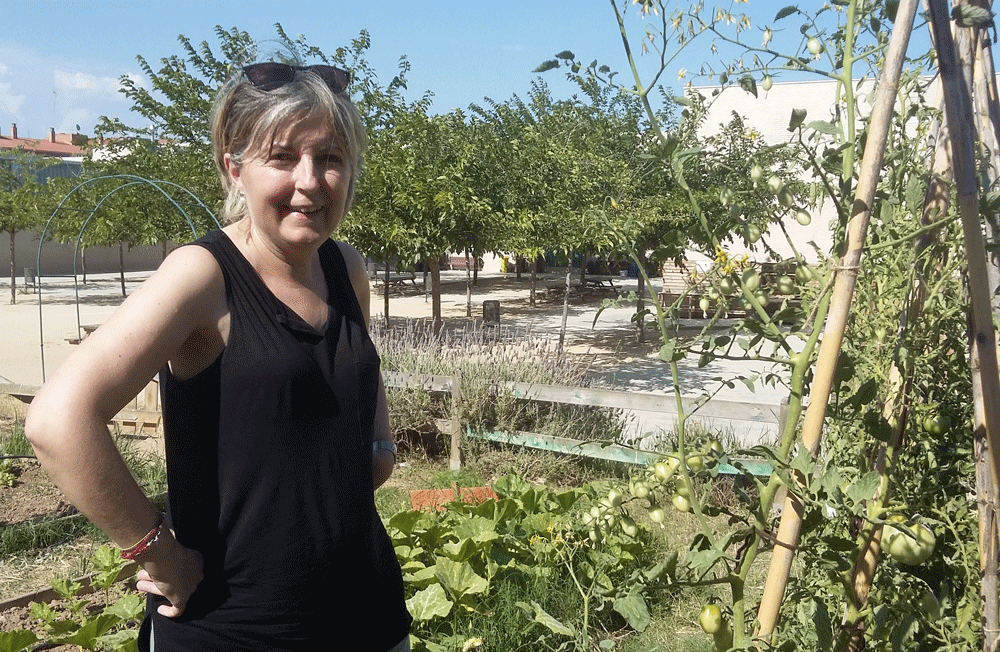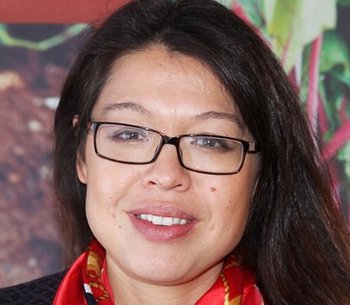Two cities united by a love of good food
Edited on
24 June 2019As URBACT opens its first call for Transfer Networks here’s a story of how a Good Practice from one city was adapted and transferred to a completely different local context.

Overlooking rolling countryside just 9 miles from Barcelona, the city of Mollet del Vallès always had a tradition of eating well and protecting the land. But there was never a city-wide food policy linking producers and consumers.
That was until 2013 in the midst of economic crisis when the City Hall set up an International Relations Department to look for innovative ideas on public services and networking opportunities through EU programmes like URBACT. At that time, Södertälje in Sweden, a Good Practice city leading an URBACT pilot transfer network called ‘Diet for a Green Planet’, was seeking Transfer Cities just like Mollet del Vallès with whom they could share their good practice.
The city of Södertälje, with 95 000 inhabitants, has a reputation for promoting sustainable local farming as a solution for feeding people while reducing agricultural pollution. Unlike Spain, Sweden has a national law that puts municipalities in charge of public canteens. With a municipal Diet Unit employing 250 people – including cooks – the city buys food directly from producers. Providing 24 000 free school meals a day, they have reduced meat consumption by 30% since 2010, and reduced leftovers by up to 40%. About 60% of Södertälje’s schools are supplied with local, seasonal, organic food.
(Discover 97 other URBACT Good Practices in light of the new Transfer Networks)
How Mollet set out to adapt and adopt Södertälje’s approach is a story of how innovative urban policies can travel quickly and have an impact across borders thanks to URBACT.
(Read more about URBACT’s call for Transfer Networks)
By joining the ‘Diet for a Green Planet’ beginning of 2014, Mollet agreed to be part of a city network with Södertälje, and other two transfer cities Łomża (PL) and Molėtai (LT) to explore how to put local food production to the benefit of the population. As required by URBACT, Mollet’s Head of EU and International Department, Albert Garcia, set up an URBACT Local Group, a local multi-stakeholder group composed of 14 people, an elected representative, council officers, school principals, cooks and local producers to meet at local level and to visit the other network partners.
(Find more about URBACT Diet for Green Planet)
After their first trip to Södertälje to discover if and how Mollet could transfer the Diet Policy to its local context, feelings were mixed. “When we came back from Sweden, the suitcases we were carrying were packed full of ideas,” says Garcia. “But we also had doubts. Our cities were so different in terms of food tradition and management, human resources, budget : where to start transferring and adopting what we’d learnt? How would we make it work?...”
In the Spanish town of Mollet, where the whole task of supplying and running public canteens is outsourced to private companies, this central approach to food was unheard of. “Reading about Södertälje, I was amazed to discover how diet could even exist as a concept for a city council! For us, Södertälje’s Diet Policy and Unit was like a UFO!” recalls Albert Garcia. “The municipality wanted to create markets for local food as foreseen in the city strategy for 2025 but the public canteens had never been seen as a solution for agri-urban growth! Yet, we have this fantastic agro-ecological park of 734 hectares, Gallecs, making up 50% of our territory, a culture of enjoying good food, and a climate for growing tasty produce year round” says Garcia.
Just after the first visit to Sweden, Mollet carried out a baseline study , an URBACT network requirement, with its first ever quality audit of the food served in its public canteens. The results were double-sided: while children and parents seemed happy with the quality and taste, the audit revealed that much of the food that children were eating had been frozen, pre-prepared and brought in from far off places. Some said: “Why change the system if people are happy and we don’t have any complaints?” But Södertälje’s inspiring results, and the prospects of local economic growth and a healthier way of living in Mollet pushed the council forward to reform.
Adapting rather than copy-pasting a Good Practice
As it was impossible for Mollet to set up a Diet Unit purchasing directly local food in canteens, the city adapted Södertälje’s Good Practice to its own standards and specificities. Council officers Nuria Duno and Antonio Martinez transformed the old public procurement system to a new model, this time based on quality rather than price to transform supply, enabling hundreds of children to eat food from nearby farms – without increasing prices for families. This new public procurement system was drawn up in 2014 based on Södertälje’s ‘Diet for a Green Planet’ principles – Tasty and healthy food, Organically grown, Less meat, More vegetables and wholegrain, Seasonal food, Locally produced, Reduced food waste.
 Rather than choosing companies on price alone as in the past, under the new model the council sets a fixed price for running its canteens, and then uses a points system to select and monitor the winning company based on quality. Tendering companies are compared according to their scores on areas such as: Nutritious and tasty food (factors here include “Not use pre-cooked and fried food”, “At least 10 different vegetables per week”); Ecological foodstuffs; and Local fresh produce (which includes “average distance from vegetable suppliers <30 km (19 miles)”).
Rather than choosing companies on price alone as in the past, under the new model the council sets a fixed price for running its canteens, and then uses a points system to select and monitor the winning company based on quality. Tendering companies are compared according to their scores on areas such as: Nutritious and tasty food (factors here include “Not use pre-cooked and fried food”, “At least 10 different vegetables per week”); Ecological foodstuffs; and Local fresh produce (which includes “average distance from vegetable suppliers <30 km (19 miles)”).
“It wasn’t easy to find good companies that could meet these criteria. We also needed legal advice to comply with EU public procurement regulations. This was a bit complicated,” says Martinez quietly. “We’ve made a few adjustments. Other towns are now showing interest, as well as private schools outside our direct control.”
Some of these adjustments were on costs. Organic fresh produce from small producers costs more than industrially produced, re-heatable meals. To keep prices down for the families, the council has limited other costs, by reducing the cooks’ working hours for example, and encouraging providers to lower their profit margins.
Benefits for the Transfer City and its local community
Today in Mollet, children from three public kindergartens and from the two municipal centres for people with disabilties eat healthy lunches, prepared with lentils, chickpeas, tomatoes, lettuce, beans, carrots and other veg from Gallecs – the 700-hectare agro-ecological park on the city’s doorstep. A steady supply of other fresh food, including meat and fish is ensured thanks to an agreement with a regional association. Parents in three of the 10 publically run primary schools have followed suit to transform their canteens, and yet more schools are showing interest – in Mollet and beyond. The food served in Mollet’s public canteens is now, on average, more than 80% organic, and 100% seasonal. All the vegetables travel less than 30 km (19 miles) from field to fork. Even the bread is baked locally with flour from stoneground spelt, an ancient variety reintroduced in the agricultural park of Gallecs thanks to the research programmes that the Consortium of Gallecs and the University of Barcelona run together. Surplus vegetables are processed in the agro-ecological park’s shared kitchen, right next to the farm shop and a quaint stone chapel – now a much-coveted wedding venue.
All this activity means more jobs and economic development. In Gallecs, there are about 20 local producers today, some of them employing about twice as many people as in 2013, and numbers are growing. Gallecs now counts 7 exploitable hectares, compared with 2 hectares before the project started, and local producers now supply 14 public canteens in other cities of the region. “We’re attracting young people back to the fields. There are a lot of new initiatives, all on a small scale,” says Gemma Safont, who manages the “Consortium for Gallecs”, a body set up in 2005 by Mollet, the surrounding cities and the Catalan Government, to encourage organic farming, protect the environment, and improve lives. Growing up here on her family’s farm, Safont has watched the area become a haven, not just for plants and wildlife – but also for some 750 000 people who visit every year from surrounding cities.
Changing habits and overcoming difficulties
Adapting the good practice of local, seasonal organic school meals from Södertälje to Mollet required a change of rules and attitude.
For Garcia, the secret was to find “allies”, get the right people on board from the start. As every URBACT city, Mollet set up its own URBACT Local Group of enthusiastic teachers, local farmers and cooks, politicians, kindergarten managers, and civil servants- mirroring the one already existing in Södertälje. The council also linked up with the Ecological School Association of Catalonia, who gave advice on reorganising canteens, and carried out audits. “This URBACT Local Group was the perfect platform for bringing local actors together. The sense of belonging, a joint commitment to a shared cause… it’s the only thing making these changes sustainable,” says Garcia.
Exchanges and visits between Södertälje and Mollet brought a feeling of responsibility and change of mindsets in decision-makers. After a three-day visit of a political delegation from Södertälje, Josep Monras, the Mayor of Mollet, realised the potential of using food as a way of reaching environmental, health and economic goals. Food suddenly became the mayor’s favourite subject.
There have been a few hiccups along the way, including cultural differences about the virtues of meat. Some parents are unhappy that meat is sometimes replaced by vegetable protein. One mistake, dubbed “the great burger crisis” by Garcia and his colleagues, was to serve each child with half a large burger: people thought they were being swindled by authorities putting cost-cutting above their children’s health.
Similarly, in the Gallecs-based Can Vila, a school for 157 children of all ages with special needs, cooks have to be particularly careful about allergies and other dietary requirements – some children are fed via gastric tube. Autistic children in particular found it unsettling to adjust to wholegrain pasta and bread, and meals without meat. Troubles eased slightly when lentils were made to look like meat. The principal, Montse Tarres, says the shift to new ‘green diet’ menus could not have gone ahead without close support from the parents.
Overall, teachers and principals here, and at a local nursery, say the system is working. With food – sustainable production and healthy eating – as an integral part of the educational programme, the experience has been “very positive” for the families, and professionals.
Mireia Oliva, principal of the pioneering Can Besora school, has been part of the local group all along, visiting Södertälje and helping Mollet Council. It’s given her energy to renew her school’s commitment to healthy, local food. Has this exchange been a useful experience, with positive effects on the children? “Molt, Molt, Molt” – A lot, a lot, a lot.
Benefits for the Good Practice city
For Södertälje, exchanges with Mollet was not just a one-way transfer process. Thanks to meetings and study vists to Mollet and the other two transfer cities, Södertälje itself benefitted from the ideas, suggestions and experience coming from their peers and reflected on how to improve and upgrade their own policy.
The main partner in Södertälje was Head of Public Meals, Sara Jervfors. She was particularly impressed by the relaxed, positive approach in Mollet, the nutritional potentials of delicious year-round Mediterranean food, and the strong culture of sharing and enjoying meals.
 “Mollet were really advanced in the way they cooperated with the vegetable farmers. They had good ideas for linking schools with local producers. We learnt a lot about the concept of a consortium for sharing management of agricultural parks – and now we’re developing one too”, said Jervfors.
“Mollet were really advanced in the way they cooperated with the vegetable farmers. They had good ideas for linking schools with local producers. We learnt a lot about the concept of a consortium for sharing management of agricultural parks – and now we’re developing one too”, said Jervfors.
Thanks to these mutually beneficial exchanges, Mollet and Södertälje are now part of another URBACT network, Agri-Urban, to foster even more the economic potential of sustainable local food chains.
(To apply for an URBACT Transfer Network as a Good Practice or Transfer city, consult the Terms of Reference for the Creation of Transfer Networks and the Guide to Transfer Networks)
The future after the end of the URBACT network
Mollet has made progress since the Diet for a Green Planet exchanges in 2013-15. The local group has evolved and now meets regularly to discuss municipal actions related to food. This ‘food policy group’ helped set up the city’s 2015 diet policy- voted in Swedish-style, with cross-party consensus- was a real milestone for the council and a clear asset for the city’s future. Today, they are continuing the city’s strategy to turn Gallecs into a major local supplier of seasonal, organic produce.
Part of this is a project to convert an old farm into an e-commerce storage and delivery centre next to the school for children with disabilities. Having secured investment at local and regional level, the idea is to scale up local food businesses, giving some adapted jobs to people with handicaps.
There are also plans to link the food and health sectors, with Mollet Hospital, to fight diseases associated with poor diets and obesity, and encourage diets with less sugar, salt and meat, and more vegetables and non-processed foods.
In the council offices, Antonio Martinez reflects on what would be different if Mollet hadn’t met Södertälje. “Everything!” he exclaims. “There’s a chance we’d be right where we were five years ago, facing budget cuts, but no way to improve our services. We’ve managed to introduce something new – without increasing costs.”
Discover:
 Submitted by Amy Labarrière on
Submitted by Amy Labarrière on




